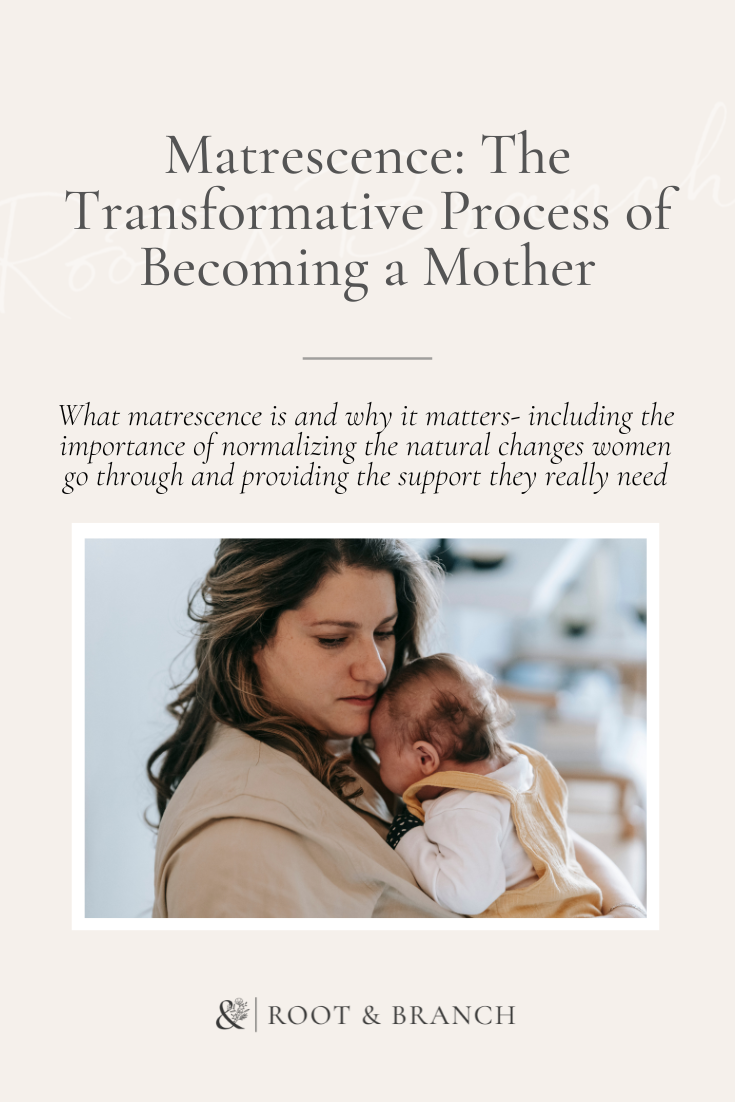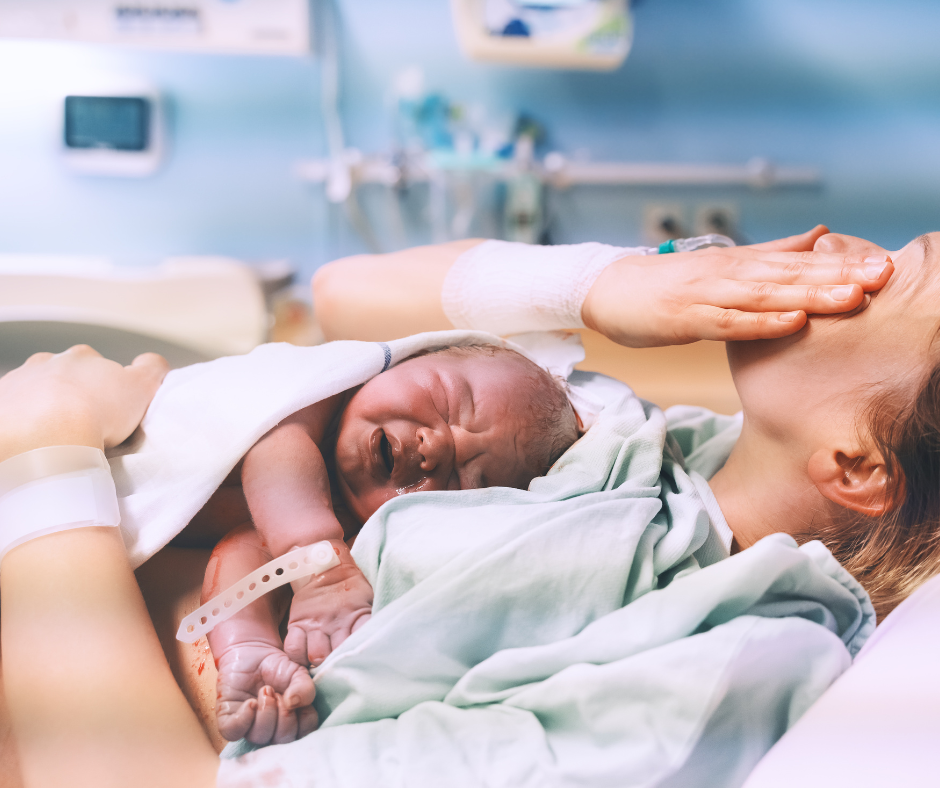Matrescence: The Transformative Process of Becoming a Mother
All those changes you go through when you become a mom? That internal and external transformation- even turmoil- you feel in the time before, during, and after pregnancy?
It’s not all in your head. And there’s nothing wrong with you for experiencing it, even struggling through.
There’s actually a word for it:
Matrescence.
And it’s time we talk about and normalize it so women don’t feel so alone and can get the help they need to not just survive through it, but thrive.
“When a baby is born, so is a mother.”
And we don’t expect babies to come out of the womb knowing how to walk, talk, take care of themselves, and just be self-sufficient humans.
So why do we expect new mothers to just *snap* be parenting experts, go right back to work, fit in their jeans again, and overall return back to who they were and the life they had before giving birth? Oh and “LovE eVerY miNutE” of it?
It’s ridiculous, right? And you know if you’ve gone through it, you usually feel a lot different from what society says and especially portrays is normal for new moms.
What exactly is matrescence and why is it so important?
Dana Raphael, an anthropologist, first coined the term in the 1970s to encompass the process of becoming a mother.
Matresence encompasses all of the drastic and holistic changes-physical, mental, emotional, social and more- that women experience when they transition from maiden to mother. These changes can start even before pregnancy and continue through the initial years after birth. They’re also experienced to some degree with each new child- although with the first, can understandably be more intense.
For many women, this whole process actually takes 2-3 years.
Similar to “adolescence,” it is a developmental passage. And for women who become moms (and through whatever way they do), it’s not avoidable. The only way out is through.
In developing this term and truly, this entire area of study, Raphael made an especially interesting observation: Western cultures typically announce that “a baby has been born,” while others phrase it as “a woman has given birth.” It’s a slight distinction in wording, but holds a deep meaning. Modern, especially Westernized societies, are very baby & child-centric, while others
And while we may dote more on women when they’re pregnant, the conversation often shifts to the baby once he/she is born— questions like “How is the baby doing/eating/sleeping?” dominate over “how are you, the mother, doing/eating/sleeping?” The obsession is on what the baby needs vs. what the mother needs- which yes, babies are helpless beings however, their needs early on are pretty simple and easily met by the mother/parental unit.
Moms on the other hand are the ones that need more help. They’re healing from childbirth- leaking milk, blood, sweat, and tears- while caring 24/7 for their babies with little time or energy for themselves, while of course, adjusting to their new role and identity. Traditionally, this all was respected and honored with beautiful and meaningful traditions and rituals to prioritize the wellbeing of the new mom- to mother the mother.
Yet moms today often feel forgotten, even isolated and neglected. And as a result, often feel like they’re the problem when they struggle through this huge transformation.
There are so many normal, natural changes women experience during this time.
The physical and physiological changes are the ones most often focused on- like changes to body weight and size, hormones, even brains (as shown through research like this and this)- but many other areas go through transformation including one’s identity, relationships and family dynamics, daily routine, career, priorities and goals, spiritual beliefs, and more.
And through this, many emotions can arise, even seemingly conflicting ones. Feelings around the differences in the realities of being a mom vs. expectations often need to be processed. For many new moms, past stress and even traumas especially from childhood can resurface.
So if you had a baby recently and are:
Feeling “lost” in motherhood
Grappling with finding your new identity
Grieving your prior self and life
Feeling like your body is no longer your own
Struggling with how to care for yourself in this new role
Experiencing mixed emotions about being a mom
Ashamed that you’re not enjoying every moment
Surprised by the depth of feelings you feel
Wondering why even after a year or two, you haven’t found your footing.
…you are far from broken and are not alone.
If you’re struggling, know that the problem isn’t you- it’s that this period and all of the changes during it aren’t adequately recognized and therefore, properly supported by our modern society.
Instead of being cared for and nourished like they need, new moms are given a single postpartum check-up (and at 6 weeks after birth- what can feel like an entire lifetime later) where they get a pen-to-paper screening quiz for mental health challenges (at a time when most moms are in a total blur and it’s common to experience the onset of symptoms much later) and an “all clear” to return to normal life- including exercise and sex!
At least in the U.S., there’s no universal paid maternity leave, so women are going back to work well before they’re physically, mentally, or emotionally ready (25% of women returning before 2 weeks postpartum).
And not to mention all the unrealistic pressure to “bounce back” to their pre-baby bodies, lives, and selves new moms get…
It’s no secret this population isn’t getting the support they require to heal, revive, and thrive- during the fourth trimester, but also far beyond it.
Especially because matrescence still isn’t discussed in the mainstream, many women aren’t aware of these changes and therefore, can feel ashamed to discuss them.
Maternal depletion is becoming so common today because of these disconnects between what’s needed and what’s provided. Between what’s emphasizes as the most important things- the top markers for “success” as a mom- and what truly are.
And while matresence can be full of challenges, it’s far from a negative thing.
Many of the changes and feelings experienced during this time do overlap with symptoms of postpartum depression, anxiety, and other perinatal mood disorders. But I personally feel that it’s when they aren’t recognized and supported, women are more vulnerable to mental health challenges.
And maybe if we as a society provided more holistic and impactful help for new moms, maternal mental health as a whole would improve. Women may not feel so alone, even broken during this process.
Because in reality, matrescence is powerful- women are reborn and create a new identity while also gaining new perspective on the world, new values and goals, new thought-processes and routines of her own. It’s raw and vulnerable, but so much of the human experience is. It’s natural and can be so beautiful- like a caterpillar becoming a butterfly.
Matrescence should be revered as a rite of passage. It should be honored and celebrated.
And especially because women are going through these changes far beyond the initial weeks and months, they should be better supported- especially when it comes to adjusting to this new role and caring for and nourishing themselves through this period.
Women going through matresence need more:
Time to fully heal, recover, and rehab
Help processing and integrating changes into their lives
Encouragement to make themselves a priority again
Guidance on nutrition, wellness, and self care habits that actually help them feel better
Practical tips for getting the deep nourishment and replenishment they require
Connection with other moms so they can share and process their experiences (without feeling judged for the challenges they're facing or choices they make)
Enter: Nourished Postpartum
A holistic nutritional therapy program focused on guiding mamas to properly fuel, replenish, and especially honor their bodies during this season of life.
Nourished Postpartum was created to help moms going through this transformative period- to provide not only nutrition guidance and a plan for replenishing and rebalancing their bodies, but also give the encouragement and safe space they need to help them move through this time.
Through tailored education, 1:1 assessment and guidance, and community support, you’ll learn ways to deeply nourish yourself in new motherhood- with special attention paid to nutrient replenishment, nervous system health, and simple self care practices. The challenges of this period won’t be sugarcoated or ignored, but instead validated and navigated with honesty and grace. You’ll have a safe space to discuss your experience, facilitate your healing, and move towards flourishing through this chapter of motherhood and beyond.






